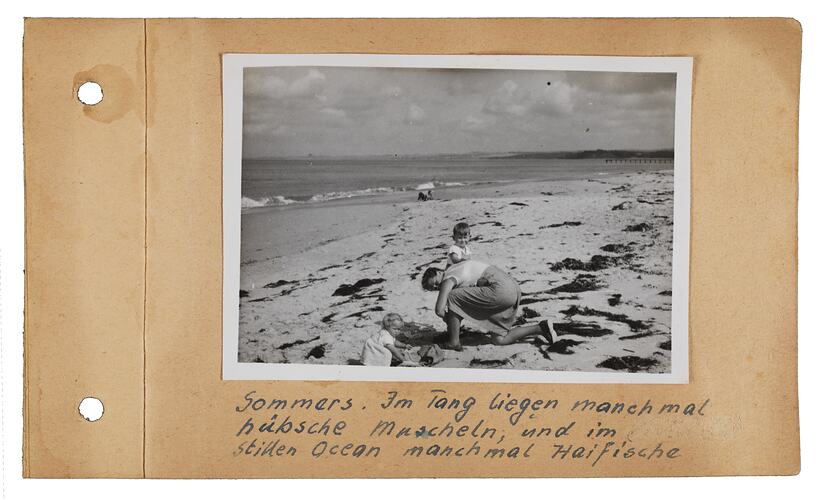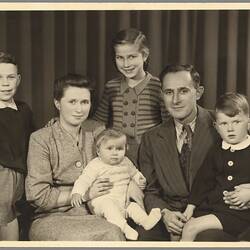Summary
Black and white photograph adhered to album page 39, of Walter Lischke and two of his children playing on a beach in Somers, Victoria where the family stayed at the migrant hostel there after their stay at Bonegilla, circa 1956.
The inscription, handwritten by Walter Lischke in German, reads: 'Sommers. Im Tang liegen manchmal hübsche Muscheln, und im stillen Ocean manchmal Haifische.' (Translation: 'Somers. Pretty shells lie sometimes amongst the seaweed, and in the quiet ocean sometimes sharks'. Translators note: It is unclear here whether 'stillen Ocean' refers to the Pacific Ocean; the term 'Stillen Ozean' was used at this time in German for the Pacific Ocean. As the word 'stillen' isn't capitalised, it is translated as as an adjective).
Jutta the Lischke's eldest child recalls: 'Our next camp was Somers near Queenscliff. At this time, our father was working, Mum, and us were mostly alone. For me it was a lovely short time, the beach right nearby. Something we had never seen before.' (Jutta Iwatschenko nee Lischke written recollections, 21.01.2017)
This photograph is one of a series of forty black and white photographs adhered to pages within a small album. The photographs were taken by Walter Lischke, before, during and just after his migrant voyage to Australia with his wife and four children on the MS Skaubryn in November-December 1955. Walter put the photos in the album after arriving, entitled 'Our Australian Trip 20.11 - 31.12.1955...Our dear grandmother', and sent it back to his wife Gerda's mother in Germany. After she died three years later, the album came back to the family in Australia.
The album, with each photograph annotated in German, commences in Bremerhaven from where the family departed Germany, and follows their journey to Australia. Also refer to record HT53880, the camera with which Walter Lischke took all the photographs.
Description of Content
Man and two children playing on seaweed-strewn beach
Physical Description
Black and white photograph
Significance
Statement of Historical Significance:
This collection provides an evocative insight into one family's post World War II migrant journey, from processing and transport from Bremerhaven, Germany through the ship voyage, ports, arrival and processing at Station Pier, Bonegilla and their early settlement. The photo album compliments other diaries and photo journals in the Museum's collection and demonstrates the importance to migrants of documenting their journey and creating an enduring record of this seminal human experience. The camera with which the photographs were taken is also part of the collection, providing an often rare tangible link between the technology and what it produced and the technological era represented.
More Information
-
Collecting Areas
Migration & Cultural Diversity, Transport, Images & Image Making
-
Acquisition Information
Donation from Sybille Ims, 15 Apr 2015
-
Person Depicted
-
Person Depicted
-
Person Depicted
-
Format
Photograph, Black & White
-
Inscriptions
Caption handwritten in German: 'Sommers. Im Tang liegen manchmal hübsche Muscheln, und im stillen Ocean manchmal Haifische'
-
Classification
Migration, Settlement - cultural & social life, Excursions & outings
-
Category
-
Discipline
-
Type of item
-
Keywords
German Immigration, Migrant Hostels, Migrant Reception Centres, Migrant Workers, Shipboard Travel, Photography, Displaced Persons, Refugees

